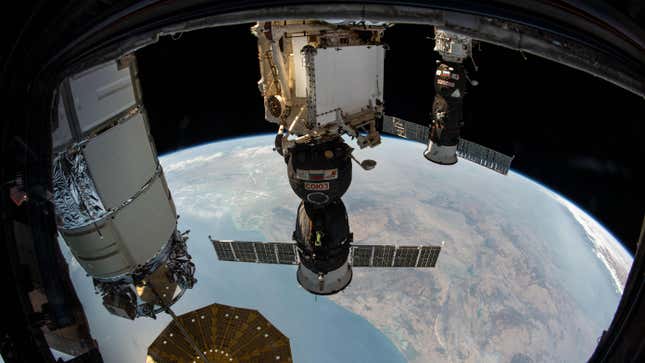
We’ve all had a problem roommate at some point in our lives, but probably not in low Earth orbit. Roscosmos received an unmanned Progress resupply spacecraft on the International Space Station last Saturday. When cosmonauts cracked open the hatch, everyone smelled an unexplained odor and there were droplets in the air. The incident launched yet another inquiry into something going wrong on the Russian side of the ISS.
To be clear, this wasn’t a misunderstood prank or a punctured drink pouch. NASA astronaut Don Pettit described the smell as similar to spray paint, Ars Technica reports. NASA released a statement on X, still commonly referred to as Twitter, reading:
“After opening the Progress spacecraft’s hatch, the Roscosmos cosmonauts noticed an unexpected odor and observed small droplets, prompting the crew to close the Poisk hatch to the rest of the Russian segment. Space station air scrubbers and contaminant sensors monitored the station’s atmosphere following the observation, and on Sunday, flight controllers determined air quality inside the space station was at normal levels.”
Along with the quarantine and extra air scrubbers, the cosmonauts on ISS put on protective equipment until they were certain that the station’s environment was safe. This isn’t the first time that Russian spacecraft have caused concern for ISS personnel. A different Progress resupply spacecraft in February 2023 and a Soyuz spacecraft in December 2022 suffered coolant leaks. Roscosmos claimed that both vehicles were struck by micrometeoroids or space debris.
While the explanation for prior incidents is plausible but not verifiable, there still isn’t a consensus explanation for why there are persistent air leaks in a Russian module’s vestibule. NASA fears the air leaks are warning signs of a catastrophic problem endangering the entire station. Roscosmos claims it’s just wear and tear.
Admittedly, NASA doesn’t have a flawless record on the ISS. Remember the Boeing Starliner stranding its crew in orbit or the time NASA lost a tomato? We can say that NASA hasn’t downplayed jeopardizing the entire space station and everyone onboard.

